
- Details
- By Jenna Kunze
In a slow rollout of appointments since taking office last month, President Joe Biden has added an additional three Native American members to various department and task force positions in February, making good on “the Biden-Harris commitment to diversity.”
Department of the Interior
On Feb. 3, former attorney at the Native American Rights Fund in Alaska and a tribal member of the Chickasaw Nation, Natalie Landreth, was appointed to serve in the Department of the Interior as deputy solicitor for land.
Landreth will serve under the first Native American cabinet member, Rep. Deb Haaland of New Mexico’s Laguna Pueblo, once the congresswoman is confirmed by the Senate to the secretary of the Interior.
During her 17-year tenure at the Native American Rights Fund, which represents tribes in legal battles over sovereignty, treaty rights and environmental law, Landreth was involved in lawsuits to stop the construction of the Keystone XL Pipeline which Native groups say could pollute sacred lands and waters in Indian Country. Last year, Landreth also successfully challenged Montana's requirement that mail-in ballots have witness signatures, thereby correcting the most common reason such ballots hadn’t been counted.
Department of Transportation
Navajo Nation’s former Department of Transportation head, Arizona State Rep. Arlando Teller, was appointed last week to serve under department secretary Pete Butigeg as deputy assistant secretary of tribal affairs in the Department of Transportation. Teller is the first openly gay person to be confirmed to a Cabinet post.
He resigned from his legislative seat Jan. 31.
He is the second Navajo person to join the Biden-Harris administration, after Wahleah Johns was selected to serve as Director of the Office of Indian Energy in the Energy Department last month.
President of the Navajo Nation, Jonathan Nez, tweeted that, “Words cannot express how proud we are of these two young Navajo professionals, who have dedicated themselves to serving our Navajo people and are now moving on to the federal level to help empower all tribal nations.”
COVID-19 Health Equity Task Force
On Feb. 10, the White House named 12 members to a COVID-19 Health Equity Task Force.
President Biden and Vice President Kamala Harris created the group “to help ensure an equitable response to the pandemic, the President signed an executive order on January 21 creating a task force to address COVID-19 related health and social inequities,” according to a press release.
Among the 12 member group of diverse backgrounds, Victor Joseph of the Native Village of Tanana in Alaska was selected to serve as a non-federal task force member.
Joseph was elected to Tanana Chiefs Conference Chairman in March of 2014, and served until last October. Prior to that role, he served in various tribal positions, and as Alaska Representative on the U.S. Department of Health and Human Services Tribal Advisory Committee and the Indian Health Services Budget Formulation Committee.
More Stories Like This
Native News Weekly (August 25, 2024): D.C. BriefsNavajo Utah Commission Approves Six New Weather Stations
First Peoples Fund Announces 2026 Cultural Capital Fellows
Deb Haaland Campaign Responds to Why Her Name is in the Epstein Files
Cadiz, Inc. Announces EPA Selection of Mojave Groundwater Bank Northern Pipeline Project for WIFIA Loan Application
Help us defend tribal sovereignty.
At Native News Online, our mission is rooted in telling the stories that strengthen sovereignty and uplift Indigenous voices — not just at year’s end, but every single day.
Because of your generosity last year, we were able to keep our reporters on the ground in tribal communities, at national gatherings and in the halls of Congress — covering the issues that matter most to Indian Country: sovereignty, culture, education, health and economic opportunity.
That support sustained us through a tough year in 2025. Now, as we look to the year ahead, we need your help right now to ensure warrior journalism remains strong — reporting that defends tribal sovereignty, amplifies Native truth, and holds power accountable.
 The stakes couldn't be higher. Your support keeps Native voices heard, Native stories told and Native sovereignty defended.
The stakes couldn't be higher. Your support keeps Native voices heard, Native stories told and Native sovereignty defended.
Stand with Warrior Journalism today.
Levi Rickert (Potawatomi), Editor & Publisher

